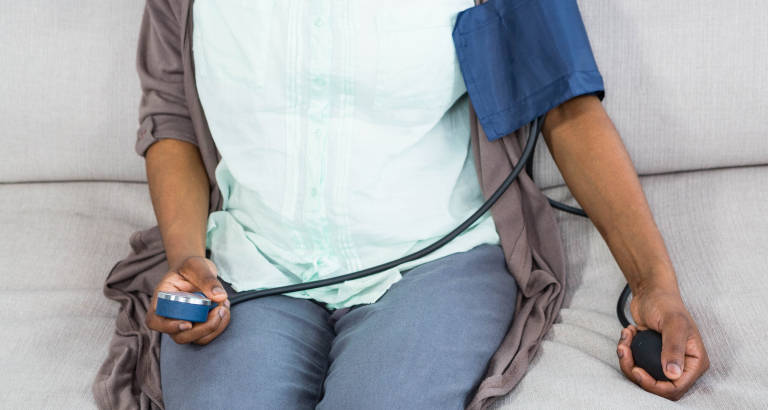Putting postpartum care into patients’ hands: using remote technology to prevent maternal morbidity and promote postpartum health equity

In 2017, the number of reported pregnancy-related deaths in the United States increased to 17.3 deaths per 100,000 live births. This number is up from 7.2 deaths per 100,000 live births in 1987. For every maternal death, another 75-100 women experience severe morbidity. More than half of all morbidity and mortality happen postpartum when clinical visits for the mother reduce. A study by Boston University School of Public Health and Boston Medical Center works to reduce these numbers through at-home health monitoring devices.
Maternal health care needs during the postpartum period can be extensive and may include monitoring of blood pressure and glucose, lactation support, contraceptive counseling, mental health screening, and a potential referral for postpartum depression. The transition from pregnancy to the postpartum period is marked by a pivot from intensive medical surveillance of the mother to an almost exclusive focus on the infant, thereby leaving many of the mother’s postpartum care needs unmet. While all of these postpartum issues are important for maternal health, our research focuses on improving postpartum blood pressure management and reducing the downstream health effects and inequities among high-risk patients at Boston Medical Center.
Up to 1 in 10 pregnancies in the U.S. is complicated by high blood pressure. Hypertension often extends into the postpartum period and may even begin after delivery. Uncontrolled hypertension is a major preventable cause of maternal morbidity and mortality during the year after delivery. It also contributes to many severe chronic medical issues such as heart failure, heart attack, and stroke.
Gaps in postpartum care
While blood pressure evaluation is recommended for all postpartum patients, the reality is that health postpartum care gaps often widen after delivery, leaving hypertension unrecognized. Up to 40% of patients do not attend their comprehensive obstetric visit at 4-6 weeks postpartum, and even fewer see a primary care clinician within one year after delivery. Commonly cited barriers to postpartum health care include insurance discontinuities, transportation difficulties, and competing priorities (e.g., caring for the newborn and returning to work).
Barriers to postpartum care have unequal impacts on low-income people and people of color. For instance, many low-income patients depend on pregnancy-based Medicaid which often expires just 60 days after delivery. As a result, postpartum patients from poor or racialized communities are at an increased risk for a host of postpartum health complications, including uncontrolled hypertension, associated chronic diseases, and mortality.
Using health monitoring device technologies to make blood pressure screening accessible at home
In April 2020, Dr. Christina Yarrington from Boston Medical Center spearheaded a postpartum remote blood pressure monitoring program for patients at risk for hypertension after delivery. In researching technologic solutions for remote blood pressure monitoring to empower more patient-centered care, Dr. Yarrington came upon Rimidi – a company that uses only cellular-enabled tools. Rather than requiring Wi-Fi availability, utilizing a patient’s data plan, or relying on a patient sending data that her mobile device pulls over Bluetooth, the data from the device is uploaded automatically via the local cellular network. The ubiquity of the cellular network bypasses the digital divide in Wi-Fi network availability that continues to affect many Boston neighborhoods. Using a health monitoring device technology that functioned independently of the patient’s personal mobile device eliminated any impact in personal cost and simplified the steps.
When COVID hit, the mandate to minimize hospital contacts and quarantine at home forced a rapid rollout of health monitoring device usage to stay on top of postpartum care needs. From the start of COVID to December 2020, over 400 women have checked their blood pressure at home while caring for their newborns. From an office at BMC, a skilled RN reviews the values and reaches out over the phone to women who have rising numbers. Following an algorithm written by Dr. Yarrington, medication is initiated or titrated remotely.
Patient experience
In the words of a recent patient, extracted from an ongoing qualitative study assessing patient satisfaction with this program:
“…there’s so much stuff going on with pregnancy and hypertension, so a lot of women are dying, especially Black women are dying because of that. Because they’re not taking their blood pressure. … that leads to preeclampsia and those conditions can lead to death. So, I feel having that type of [remote blood pressure] cuff, making sure you monitor it every day helps you to have a better chance of you not dying. I was able to be part of that and I’m super grateful that my provider was able to make sure I have that at home.”
Improving the use of home health monitoring device technologies
Our experiences with remote blood pressure monitoring have highlighted the need for other health monitoring device technologies to support postpartum women. These may include the remote monitoring of blood glucose or weight and mobile phone applications that provide lactation support. Calls to improve postpartum care are not novel but are increasingly urgent. Technologies that overcome barriers to health care engagement and ensure continuity of postpartum care could lead to huge gains in improving postpartum health and furthermore, these technologies need to be accessible by all. Partnerships with companies involved in remote health monitoring device technologies and programs, and interventions that expand the availability of such technologies to a broader patient population present a unique opportunity to make inroads in improving rates of maternal morbidity and mortality and enhancing equity.

Dr. Samantha E. Parker, PhD, MS is an Assistant Professor in the Department of Epidemiology at Boston University School of Public Health. Her research interests include understanding the relationship between prenatal exposures and infant and childhood outcomes and the role of adverse pregnancy outcomes in maternal health.
Dr. Christina D. Yarrington, MD is an Assistant Professor of Obstetrics & Gynecology at Boston University School of Medicine. Her clinical focus and research is on cardiovascular disease and maternal morbidity, infections and pregnancy, and obstetric critical care.
Dr. Mara E. Murray Horwitz, MD, MPH, is an Assistant Professor of Medicine at Boston University School of Medicine and a primary care physician in the Women’s Health Unit at Boston Medical Center. Her research focuses on the integration of sexual and reproductive health care into primary care. She is particularly interested in improving primary care after pregnancy complications associated with future chronic diseases.



